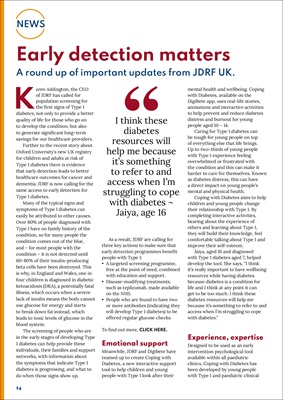
14
NEWS
Early detection matters
A round up of important updates from JDRF UK.
Karen Addington, the CEO
of JDRF has called for
population screening for
the first signs of Type 1
diabetes, not only to provide a better
quality of life for those who go on
to develop the condition, but also
to generate significant long-term
savings for our healthcare providers.
Further to the recent story about
Oxford University's new UK registry
for children and adults at risk of
Type 1 diabetes there is evidence
that early detection leads to better
healthcare outcomes for cancer and
dementia. JDRF is now calling for the
same access to early detection for
Type 1 diabetes.
Many of the typical signs and
symptoms of Type 1 diabetes can
easily be attributed to other causes.
Over 80% of people diagnosed with
Type 1 have no family history of the
condition, so for many people the
condition comes out of the blue,
and - for most people with the
condition - it is not detected until
60-80% of their insulin-producing
beta cells have been destroyed. This
is why, in England and Wales, one in
four children is diagnosed in diabetic
ketoacidosis (DKA), a potentially fatal
illness, which occurs when a severe
lack of insulin means the body cannot
use glucose for energy and starts
to break down fat instead, which
leads to toxic levels of glucose in the
blood system.
The screening of people who are
in the early stages of developing Type
1 diabetes can help provide these
individuals, their families and support
networks, with information about
the symptoms that indicate Type 1
diabetes is progressing, and what to
do when those signs show up.
As a result, JDRF are calling for
three key actions to make sure that
early detection programmes benefit
people with Type 1:
• A targeted screening programme,
free at the point of need, combined
with education and support.
• Disease-modifying treatments,
such as teplizumab, made available
on the NHS.
• People who are found to have two
or more antibodies (indicating they
will develop Type 1 diabetes) to be
offered regular glucose checks.
To find out more, CLICK HERE.
Emotional support
Meanwhile, JDRF and Digibete have
teamed up to create Coping with
Diabetes, a new interactive support
tool to help children and young
people with Type 1 look after their
mental health and wellbeing. Coping
with Diabetes, available on the
DigiBete app, uses real-life stories,
animations and interactive activities
to help prevent and reduce diabetes
distress and burnout for young
people aged 10 - 14.
Caring for Type 1 diabetes can
be tough for young people on top
of everything else that life brings.
Up to two-thirds of young people
with Type 1 experience feeling
overwhelmed or frustrated with
the condition and this can make it
harder to care for themselves. Known
as diabetes distress, this can have
a direct impact on young people's
mental and physical health.
Coping with Diabetes aims to help
children and young people change
their relationship with Type 1. By
completing interactive activities,
hearing about the experience of
others and learning about Type 1,
they will build their knowledge, feel
comfortable talking about Type 1 and
improve their self-esteem.
Jaiya, aged 16 and diagnosed
with Type 1 diabetes aged 7, helped
develop the tool. She says, "I think
it's really important to have wellbeing
resources while having diabetes
because diabetes is a condition for
life and I think at any point it can
get to be too much. I think these
diabetes resources will help me
because it's something to refer to and
access when I'm struggling to cope
with diabetes."
Experience & expertise
Designed to be used as an
early intervention psychological
tool available within all paediatric
clinics, Coping with Diabetes has
been developed by young people
with Type 1 and paediatric clinical
psychologists from across the
country, marrying lived experience
with clinical expertise. To ensure
I think these
diabetes
resources will
help me because
it's something
to refer to and
access when I'm
struggling to cope
with diabetes ~
Jaiya, age 16